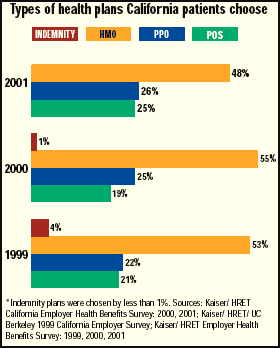Article
Practice Beat
Health Costs, Medical Group Solvency, Health Plan Choices, Drug Costs
Practice Beat
Joan R. Rose
Health Costs: Can employers improve patient safety (and save money too)?
The Leapfrog Groupa 16-month-old consortium of more than 90 Fortune 500 companies, as well as other private and public organizationshas launched a Web-based effort to "help employees make intelligent and informed health care decisions," an outcome that should also lower the cost of employee benefits.
The group's initial focus is on measuring hospital practices that improve patient safety. Through a voluntary, online survey, Leapfrog will track hospitals' progress in implementing performance standards that members believe reduce errors. For example, the survey asks whether facilities use a computerized system for physicians' prescription orders, whether their intensive care units are staffed only with intensivists, and whether they meet the group's recommended volume thresholds for certain high-risk procedures. Group members agree to use the hospital ratings in making health care purchasing decisions, and some have already begun to offer financial incentives to hospitals that implement the practices. To view the Leapfrog performance ratings of 241 participating hospitals in Atlanta, California, Minnesota, St. Louis, the Seattle/Tacoma area, and east Tennessee, visit www.leapfroggroup.org .
Medical Group Solvency: How much should health plans know about doctor's finances?
Siding with the California Medical Association, a state court has quashed HMO regulators' push to collect and publish proprietary financial data on the state's medical groups. The California Department of Managed Health Care had adopted solvency regulations that would have given insurers and HMOs full access to medical groups' confidential informationincluding profit and loss rates, patient mix, "customer lists," the reimbursement methodology used to pay treating physicians, and cash flow statements. The CMA sued to keep the information private, contending that if the DMHC were permitted to release such detailed financial information, it would give health plans an unfair advantage in contract negotiations.
Health Plan Choices: California: Still marching to its own drummer
A growing number of Californians are switching from HMOs to health plans that provide a greater choice of providers and less restrictive access to care, according to a study conducted for the Kaiser Family Foundation and the Health Research and Educational Trust. While the proportion of insured workers increased in PPOs and POS plans last year, HMO members slipped below 50 percent for the first time in many years.

Drug Costs: Maine's Medicaid waiver passes muster
In the final days of the Clinton administration, HHS granted Maine's request for a waiver to expand the state's Medicaid rebate program to include senior citizens. Now a federal court judge has upheld the Healthy Maine Prescriptions program, which establishes a drug formulary based on manufacturers' willingness to provide Medicaid-equivalent rebates to the program. Physicians must obtain state approval before prescribing drugs manufactured by companies that refuse to provide the discounts.
The Pharmaceutical Research and Manufacturers of America, which challenged the constitutionality of the program, contends it will hurt Medicaid patients by limiting their access to needed prescription drugs.
The author is a Contributing Writer.
Joan Rose. Practice Beat. Medical Economics 2002;8:16.





